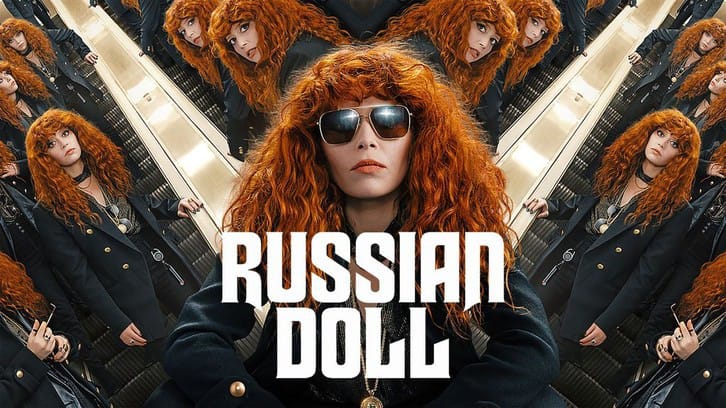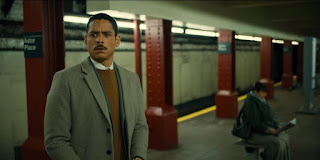It’s been three years, folks, but TV’s most existential comedy has finally returned to provide us all with another cathartic, mind-blowing, ever-loving clusterfrak of a season. It certainly does not feel like it’s been three years since the previous season of Russian Doll - for starters, I think three years rounds out in pandemic years to be more like four or five years. Regardless, the wait for more of Netflix’s dark comedy and arguable crowning achievement has finally ended, and boy, was it worth it.
For those of you seeking a quick refresher on the first season of Russian Doll, the season consisted of a clippy 8 30-minute episodes following Nadia (Natasha Lyonne), a chain-smoking, born-and-bred New Yorker staring down the barrel of her 36th birthday. After abandoning her birthday party, Nadia is hit by a car and dies - only to find herself once again in her friend Maxine’s bathroom, birthday party thumping just outside. As it turns out, Nadia is stuck in a time loop where she is fated to die before the end of the night. And she’s not the only one, as Nadia eventually discovers that another New Yorker - the neurotic, hypercautious Alan (Charlie Barnett) - is stuck in the same loop, also continuously dying before the end of the night. Eventually, the pair are able to work together to escape from their loops, which metaphorically represent the “loops” of despair, self-loathing and unconfronted trauma that both Nadia and Alan had been long trapped in. It’s good stuff, the kind of mind-bending, soul rendering themes that time loop stories are uniquely adept at addressing.
However, with the loop resolved by the end of the first season, the potential material for a second season of Russian Doll was hypothetically slim. The risk of making a second season was doubled considering that the emotional richness of the first season was so on-the-mark that any follow-up would have mind-numbingly large shoes to fill. However, season two absolutely delivers, and while it understandably doesn’t quite hit the same or as well as the first season, it is still a magnificent feat of television storytelling.
It does this by “leveling up” both the emotional issues Nadia needs to work through as well as the timey-wimey-ness of the metaphorical vehicle for those issues. This season, as Nadia prepares to turn 40, she discovers that a certain subway train acts as a portal to the past, and every time she rides it, she ends up in 1982 - and in the body of her own mother, Nora, who is pregnant with her at the time. This acts as a means for Nadia to try to repair some of the mistakes her mother made when she was young that eventually led to Nadia’s less-than-rosy childhood. Specifically, Nadia uses the portal as an opportunity to discover what happened to her family’s fortune, which came in the form of a lot of gold Krugerrands that Nora lost just before Nadia was born.
In the meantime, Nadia also gets to learn more about Ruth, her mother’s best friend and Nadia’s surrogate mother, after Nora died. While Nadia recruits Ruth in the past (played by Annie Murphy) to help look for the Krugerrands, Nadia worries for present-day Ruth, whose health is steadily declining. The perpendicular stories of Nora and Ruth (as well as Nadia’s grandmother Vera, who also comes into play later in the season) provide means for Nadia to carefully examine the feelings and regrets she has held onto in regards to her childhood, and see her mother’s drug addiction and schizophrenia in a more empathetic light.
During a late-night talk show appearance, Lyonne said that “If season one was sort of a meditation on ‘How do I stop dying?’ in a way season two is posing the question of ‘How do I start living?’” The show’s answer - “by letting go of the past” - is magnificently played-out, especially in the last few episodes of the season, when it lets itself get weird weird. In the second-to-last episode, Nadia (as Nora) gives birth to herself, then tries to steal away baby Nadia in an attempt to protect her from her mother. This action ends up breaking the space-time continuum, causing reality to collapse around both Nadia and Alan (who, after hearing that Nadia was able to inhabit her mother by riding the 6 train, began riding it himself, becoming his own grandmother, an African student studying in Berlin in the age of the Iron Curtain). The end of the season sees Nadia finally entrusting baby Nadia to Nora once again, as an 8-year-old Nadia (reading Herman Hesse’s Demian, a story about abandoning one’s childhood) looks on. It’s a heavy-handed but well-produced execution, and an incredible, wonderfully inane moment of catharsis.
The season isn’t without its flaws, however. As mentioned, as good as it was, this season felt slightly less quality and slightly less necessary than the first. Nadia’s exploration of her own history is intriguing in theory but never feels quite important enough in practice to base an entire season around, especially when the plot continues to segue at inconvenient times into moments about Ruth and Alan (the latter of whose storyline felt completely superfluous at times, barely connecting with Nadia’s at all and ending almost as soon as it begins). There are times, also, when the show doesn’t seem to know if it is trying to be about Nadia forgiving her mother for her mistakes or learning to really appreciate everything Ruth has done for her in her life. While both messages were arguably feasible to execute at the same time, the particular way that the plot oscillates between the two ideas seems to be begging for one or the other to be the focus, with neither one really winning out.
That out of the way, however, there are two things in this season that perfectly meet if not exceed their quality in the first season. The first of these is the cinematography and visual effects. Russian Doll season one has a unique visual style, red-toned and dark with pops of neon to complement the show’s New York setting. Season two expands on this style, with sharp distinctions between the 1982 and 2022 production design that make the transitions between the two blessedly easy-to-follow, and with interludes in Hungary and Germany temporarily changing the look of the show entirely. This, combined with the various trippy effects that populated the world after Nadia broke time, made season two even more visually striking than its predecessor.
The second and most pertinent improvement on season one is in the performance of Natasha Lyonne. Now, not to say her performance in the first season of Russian Doll was significantly lacking - it wasn’t. But in season two, Lyonne is twice as versatile, selling Nadia’s wry, drunken wit in the same sentence as displaying her childlike brokenness and complex whirlwind of feelings toward her mother. It was unfair that Lyonne didn’t win the best actress Emmy for her first outing as Nadia, but if she fails to nab it this year, it’s practically felonious. Nadia is one of the most distinct, ridiculous and yet grounded and relatable TV characters of the century, and Lyonne’s performance simply cannot be undersold.
I would also be remiss to point out that this season had Lyonne herself take on the role of showrunner, and an all-female writer’s room to boot. While this is in fact a nice “diversity win!” this also allowed the show to be all of the insane and wonderful things that it was this season. The show felt uniquely unafraid to tear Nadia apart and put her back together again, and painfully blunt and accurate in its depiction of strained mother/daughter relationship trauma. It’s a shining example of the real reason why we need more diversity in media production; not just so that “everyone gets a fair shot” but so that every story can be told with generosity, honesty, and understanding.
Overall, Russian Doll’s second season is nothing more or less than a treat. It wasn’t really necessary in hindsight, but it was very good, and so one makes up for the other and all is even in my books. Were it not for Netflix’s recent penchant for canceling its best shows and losing all its money, I’d even daresay that a third season would be more than welcome as well, under the right circumstances. But let’s not get our hopes up too much - I’m staying thankful, at least, for what we’ve been given.






